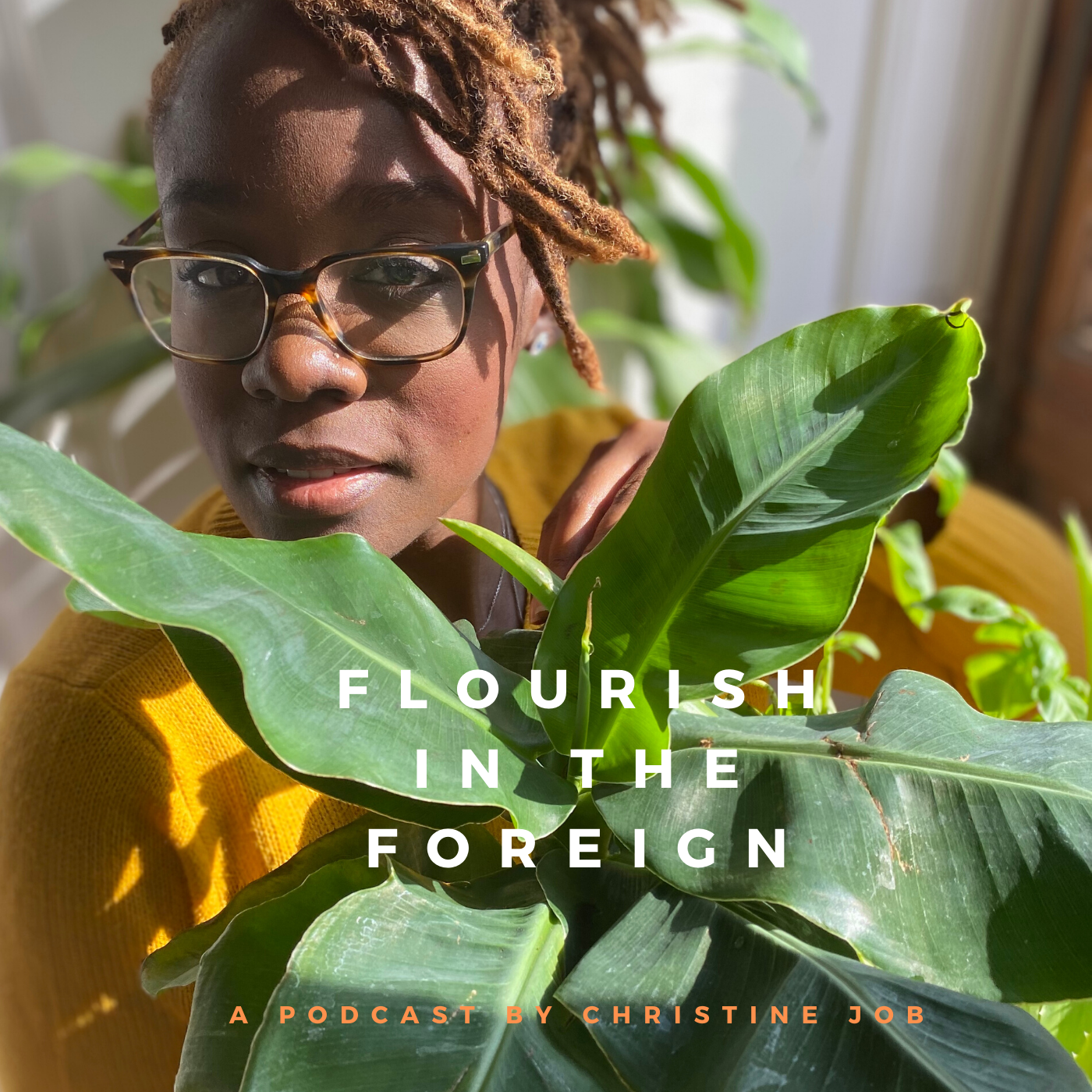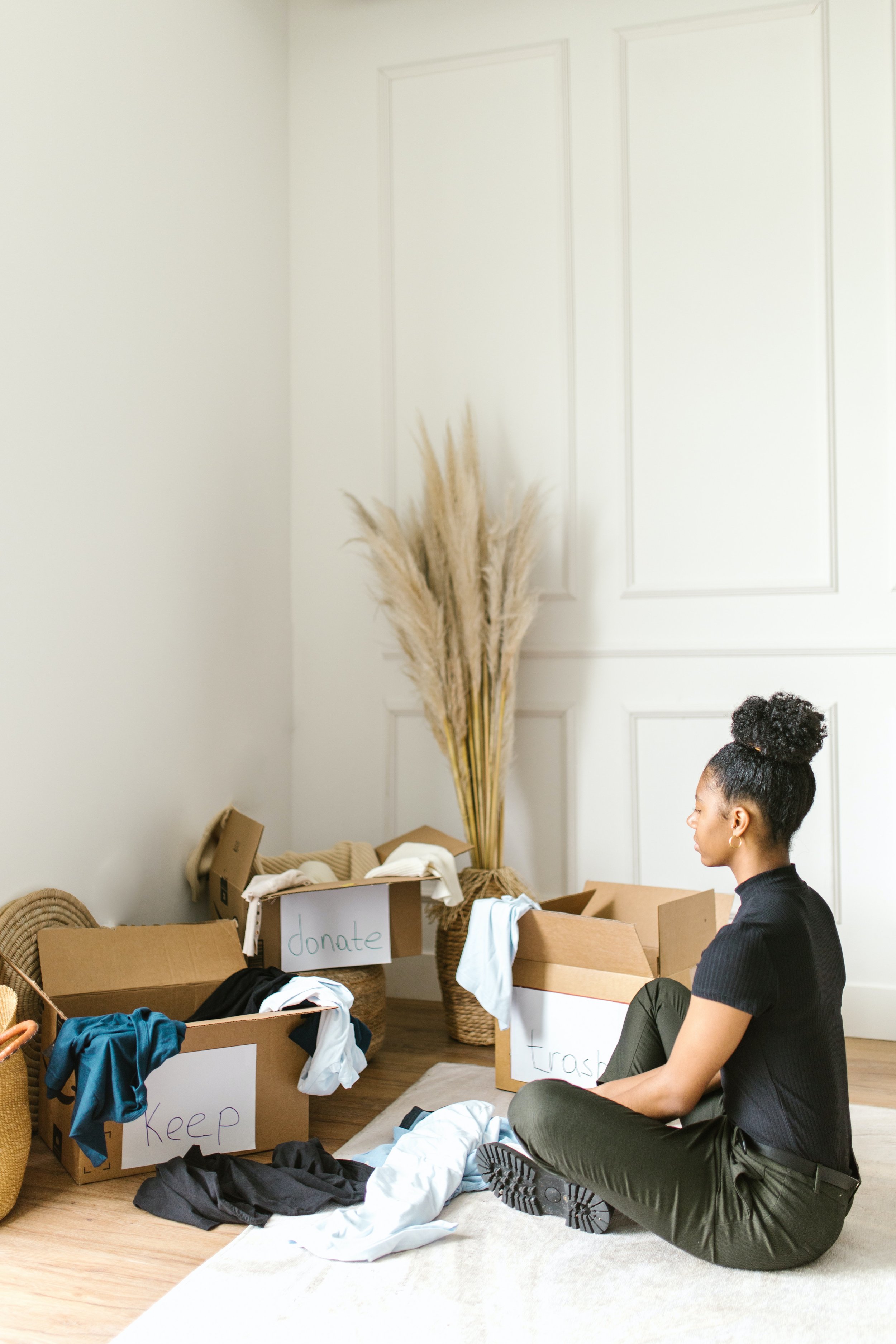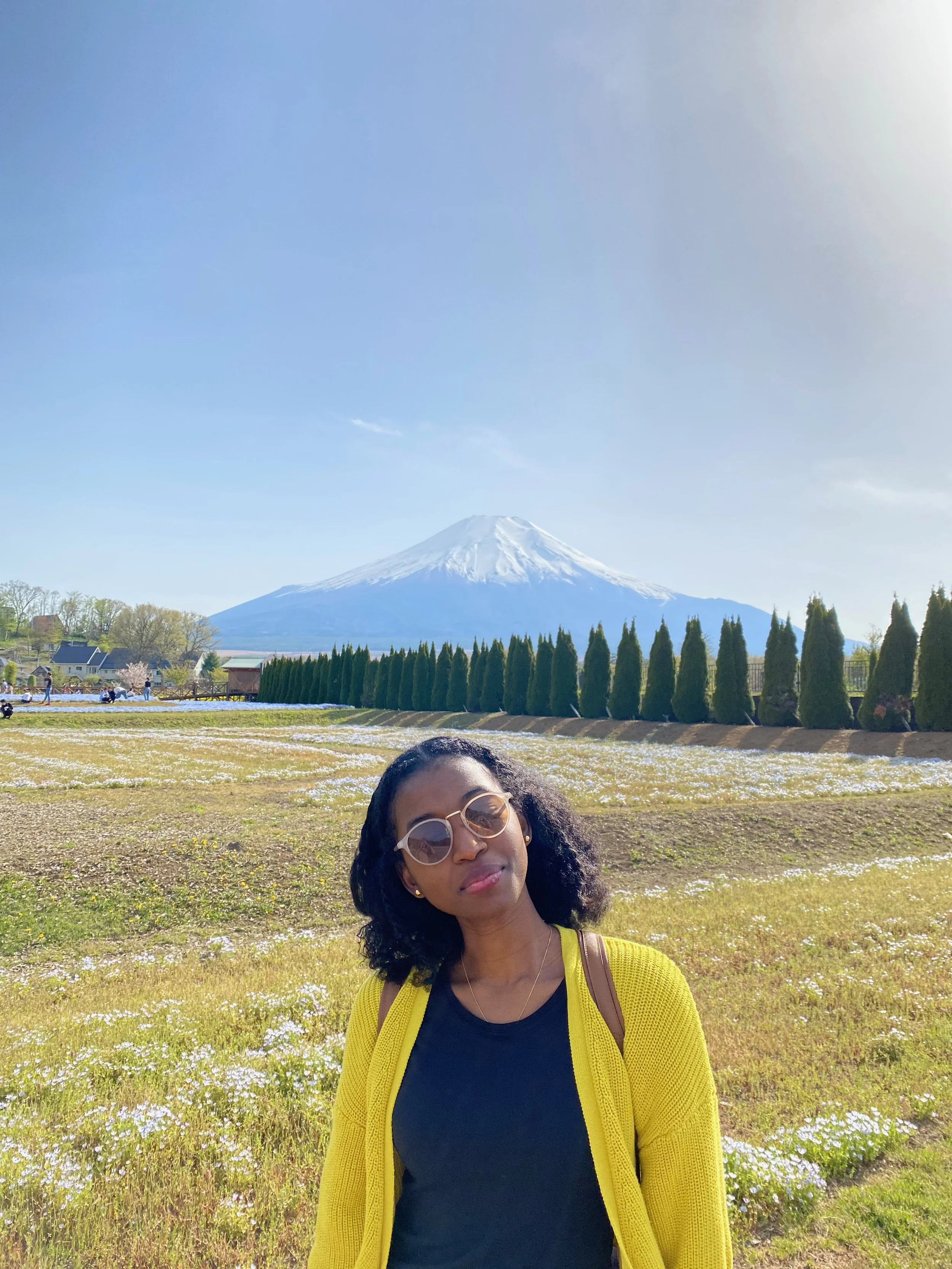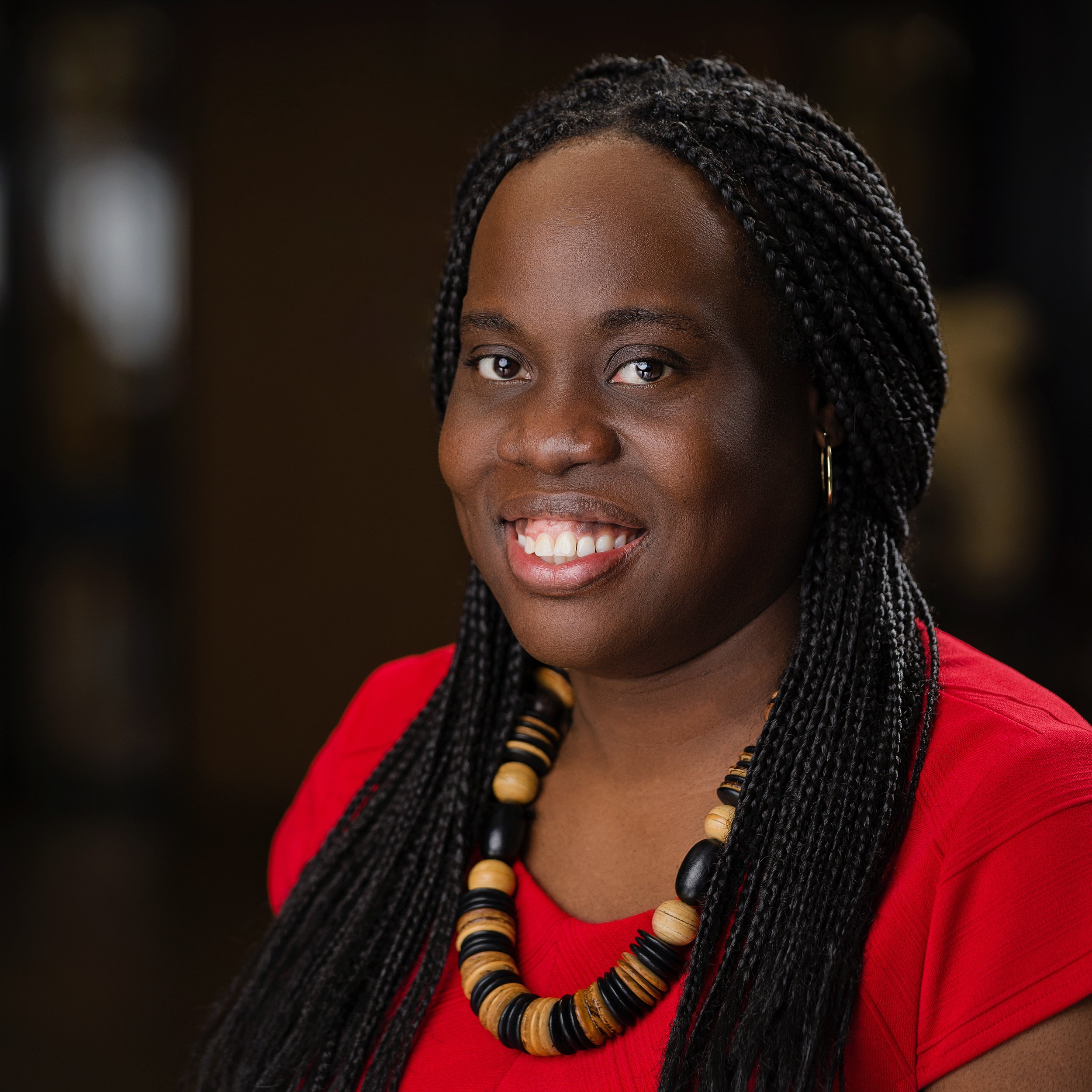Reflections on How Living Abroad Influences Home Decor Style
Before moving to Japan, I had never lived on my own. Growing up in my parents’ house, I got to see my mother express herself.
By: Annabell Stubbs
“How living in Japan has influenced your home decor style?”
The lovely host and creator of Flourish in the Foreign Christine asked me this question and I found it thought-provoking in so many ways. It offset a chain reaction of questions, answers, and further questions in my mind. It forced a sort of self-reflection I hadn’t considered on my own, so I’m grateful to her for the question.
As an architectural designer, I’ve never thought of myself as having a particular style. Especially regarding decor. To many architects, decor is a dirty word. About design styles in general though, sometimes I feel pressure from my peers in the field to define my style, my stance.
I’m still on a journey of discovery when it comes to this topic, so this blog is more of a self-exploration than a direct answer.
Living in Jamaica:
My Parents’ House & Architecture School
Before moving to Japan, I had never lived on my own. Growing up in my parents’ house, I got to see my mother express herself through the periodical changes she made to the interior decor.
Since I have no experience of living solo in Jamaica to compare my current one with, I can only reference my early ideas on design which surfaced in architecture school. I did my Bachelor of Arts in Architectural Studies at the University of Technology, Jamaica. In any architecture school around the world, you will learn about the history and elements of architectural styles.
I won’t bore you with an architectural history lesson, but do bear with me while I raise a few points that influenced my way of thinking as a designer.
In architecture school, we learned the tenets of modernism. Modernism as an architectural style resonated with me. A simple summary of the tenets would be;
Buildings should reflect the technology of their era, much like cars and cell phones do.
Ornamentation as seen in classical European architectural styles is at best, unnecessary. At worst, it is ostentatious, expensive, and hides rather than celebrates the brilliant engineering that actually makes buildings what they are. By this I mean, putting a swirly design over the connection between a column and a roof. Modernism celebrates those joints, exposing them for all to see. No frills.
These tenets affirmed my desire for Jamaica to diverge from the use of classical European architecture to signal class, power, so-called high culture, and beauty. I grew to despise any and all ornamentation. This transferred to my views on interior decor. (I am not so dogmatic now.)
In my opinion, at the time, almost everything in a typical interior was unnecessary. Honestly, I just found it easier to think out issues of functionality, rather than beauty. Designing for function gave me something to work with, what I can and cannot do. It was technically more complex but philosophically, pretty simple. Beauty was just too subjective for me. There is no right or wrong in interior design. The truth is it intimidated me, though I couldn’t admit it back then. I just boiled it down to interior decor being unimportant and focused on developing more technical skills in architectural design.
Living in 5 Different Apartments
Across 3 Prefectures in Japan
Even I get confused with the trajectory of my life since moving to Japan in the summer of 2013.
I’ll try to break it down in this timeline. Forgive the CV format.
2013-2015
Ishikawa Prefecture, hard winters
I taught English and got put up by my school in a pretty spacious 2LK (2 bedroom, living, kitchen, 1 bathroom) apartment. Everyone who visited me there commented that it looked like I just moved in. I didn’t get any new furniture and got rid of some of the stuff provided. Anyone who visited would’ve thought I was a minimalist.
I didn’t attempt to, nor had the desire to personalize the space. Teaching English was always gonna be a temporary gig. The sole objective was to save as much money as possible. Buying anything for the sake of interior decor was a waste of money, as far as I was concerned. If anything, my money went to the electricity bills. Japanese apartments are made of thin walls with no insulation or central heating. Being spacious as it was, it was even more difficult to keep it warm.
2015-2019
From Kanagawa Prefecture to Central Tokyo
From 2015 to 2019 I lived in three progressively smaller apartments. The first one I lived in while in school. It was a 6m2 (64 sqft) room with the tiniest shower room and kitchenette imaginable attached to it. The next two were sharehouses, with shared kitchens, and bathrooms. The horror stories I could tell...
Eifukucho Share House
2019-Present
Still in Tokyo
My current place isn’t perfect, it’s not as spacious and beautiful as my first one in Ishikawa, but it is mine and it feels like home. Maybe I needed the experience of the three horrible apartments in between this and the first. They made me appreciate every square meter of space I have now. They taught me that, a lot of Jamaicans may have it better than they think. They taught me through lived experience, the dos and don’ts of tiny living. Mostly, they taught me that tiny living is not for me, and I wouldn’t believe the hype if I were you. Just my humble opinion though.
This apartment is about 30m2 (322 sqft), pretty well laid out, and easy to use for the most part. I low-key hate the bathroom but, this is Japan.
Designing My Space
Function
Having been stuck in glorified broom closets from 2015 to 2019, I gained a serious appreciation for the separation of functions. I don’t want to eat, sleep, write my thesis, design buildings, and watch Netflix in the same space.
My first non-negotiable was that I was going to have a bedroom. I would do nothing but sleep in that room. Next, a dedicated workspace separate from where I relax. Furniture-wise, this meant getting a desk. I was happy to lounge on the floor in my downtime, but my boyfriend convinced me to get a very comfortable couch. Definitely did not regret that purchase. Otherwise, there’d be no coffee tables, side tables, or frills, just the essentials. The space is bigger, yes, but 30m2 (322 sqft) is still not that big. And furniture can make a space feel smaller than it is really quickly. Low-key, I’m starting to see how a coffee table would be nice, but we’ll see.
Colour and Materiality
My apartment has convincing faux wood flooring. It’s a lighter hue imitation wood, so I decided all my furniture would be made of light wood. Light colours help small spaces look bigger because they bounce light around. If any fabrics were involved, they would be light too. My bedsheets are white, my couch a light green. The flat white surface of the bed reflects the light from the balcony doors and projects it further into the deep narrow apartment. I didn’t trust myself with beige or white for the couch, because stains.
Furniture I Designed & Made

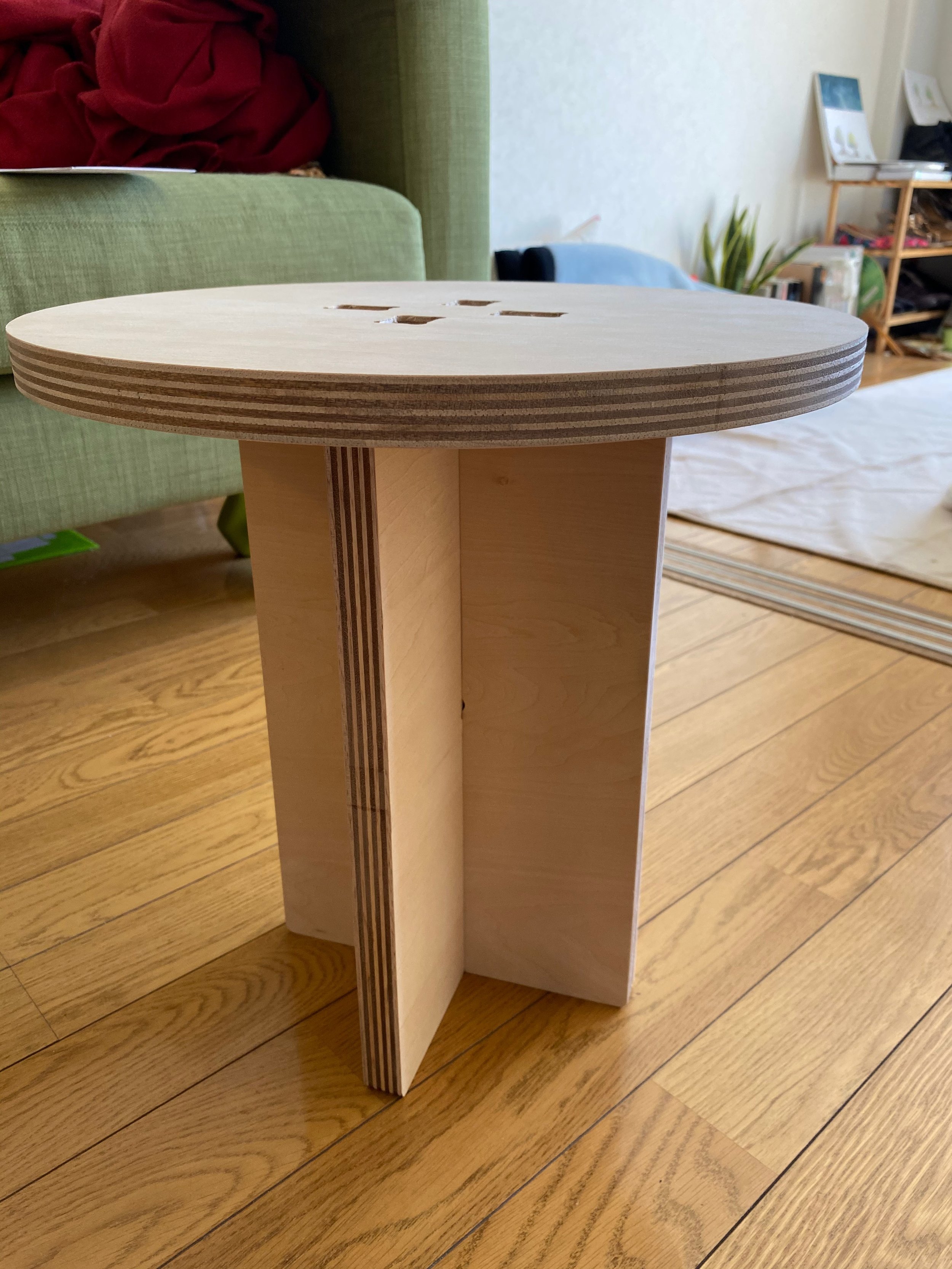
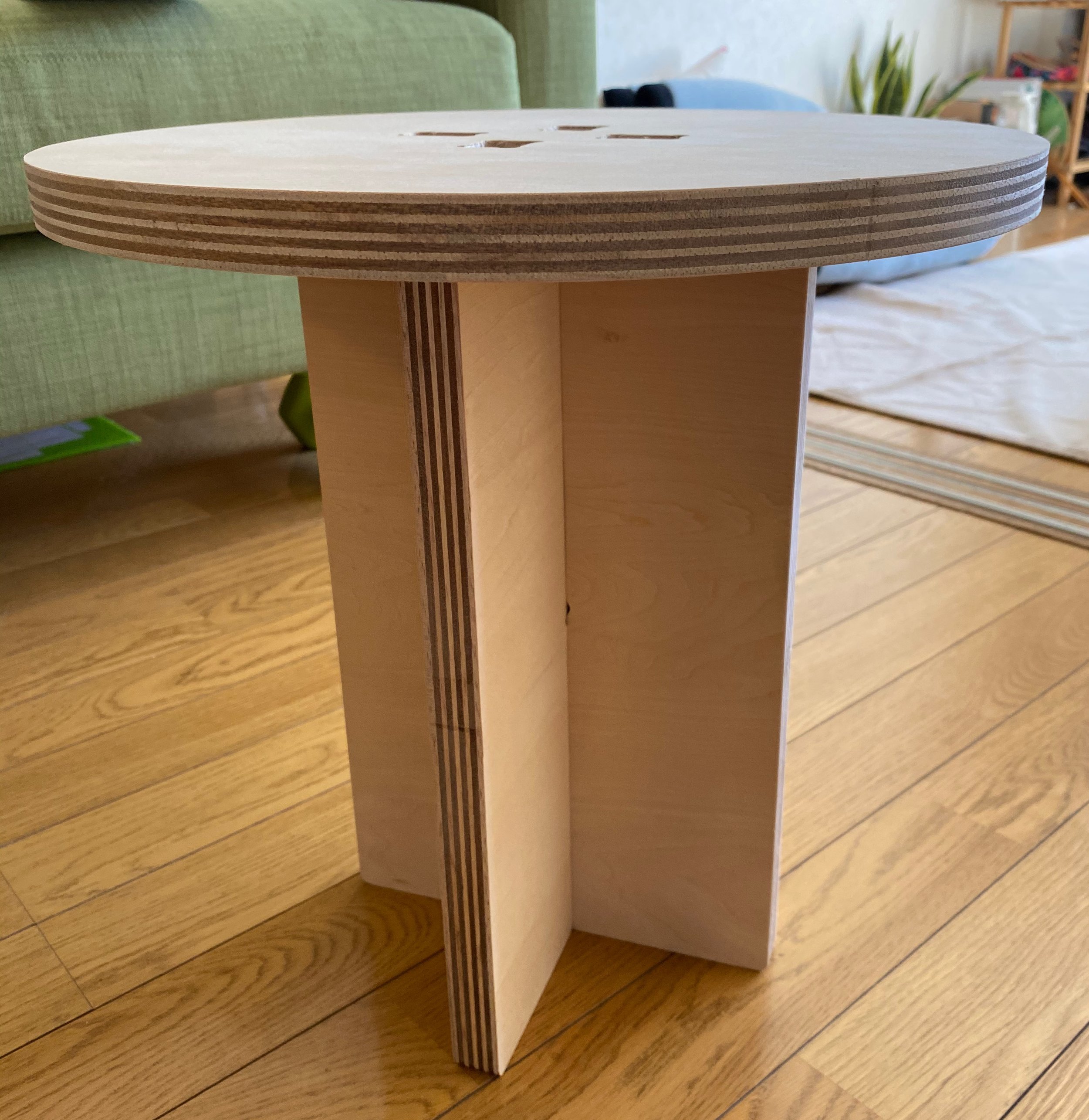
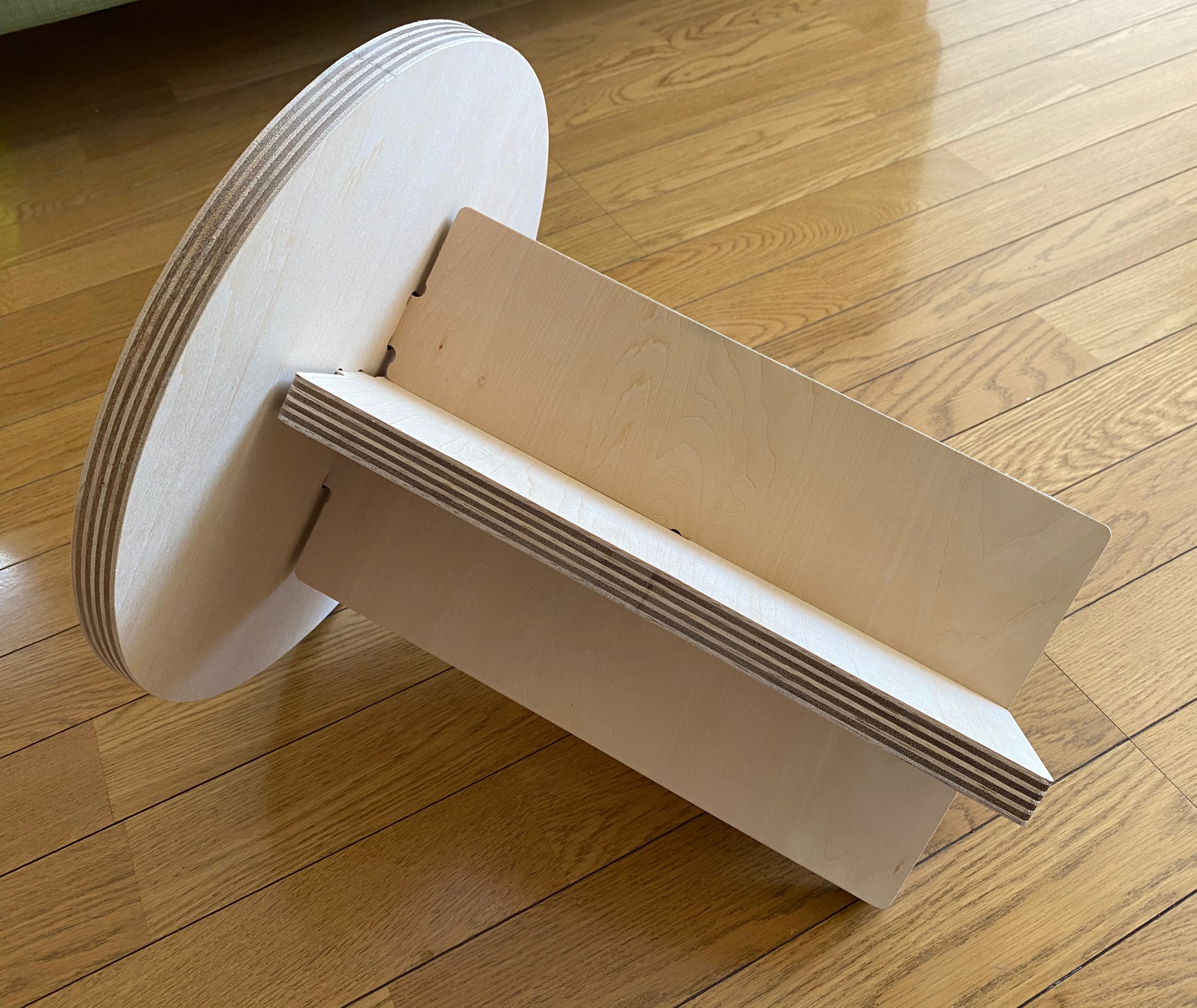
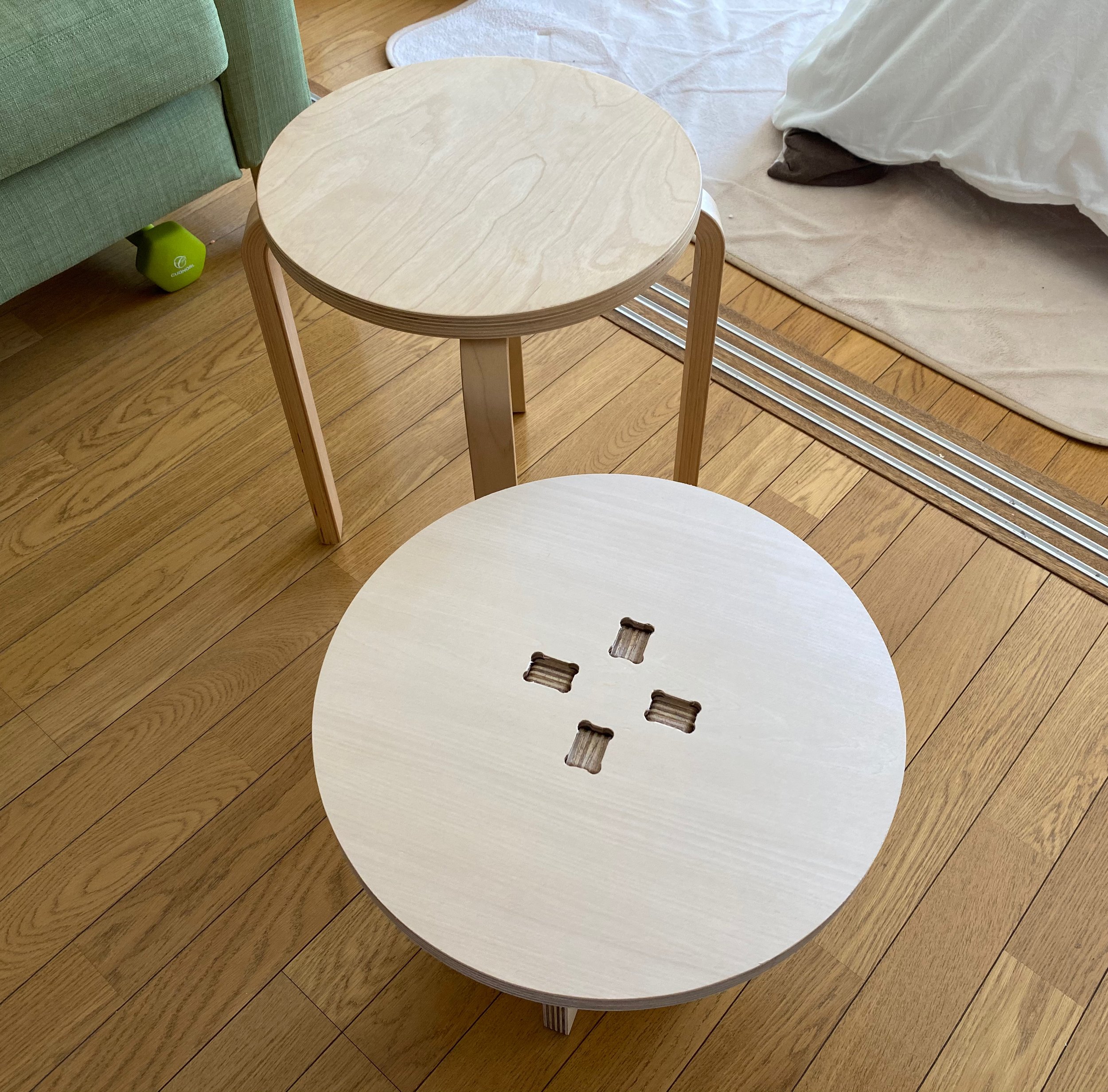
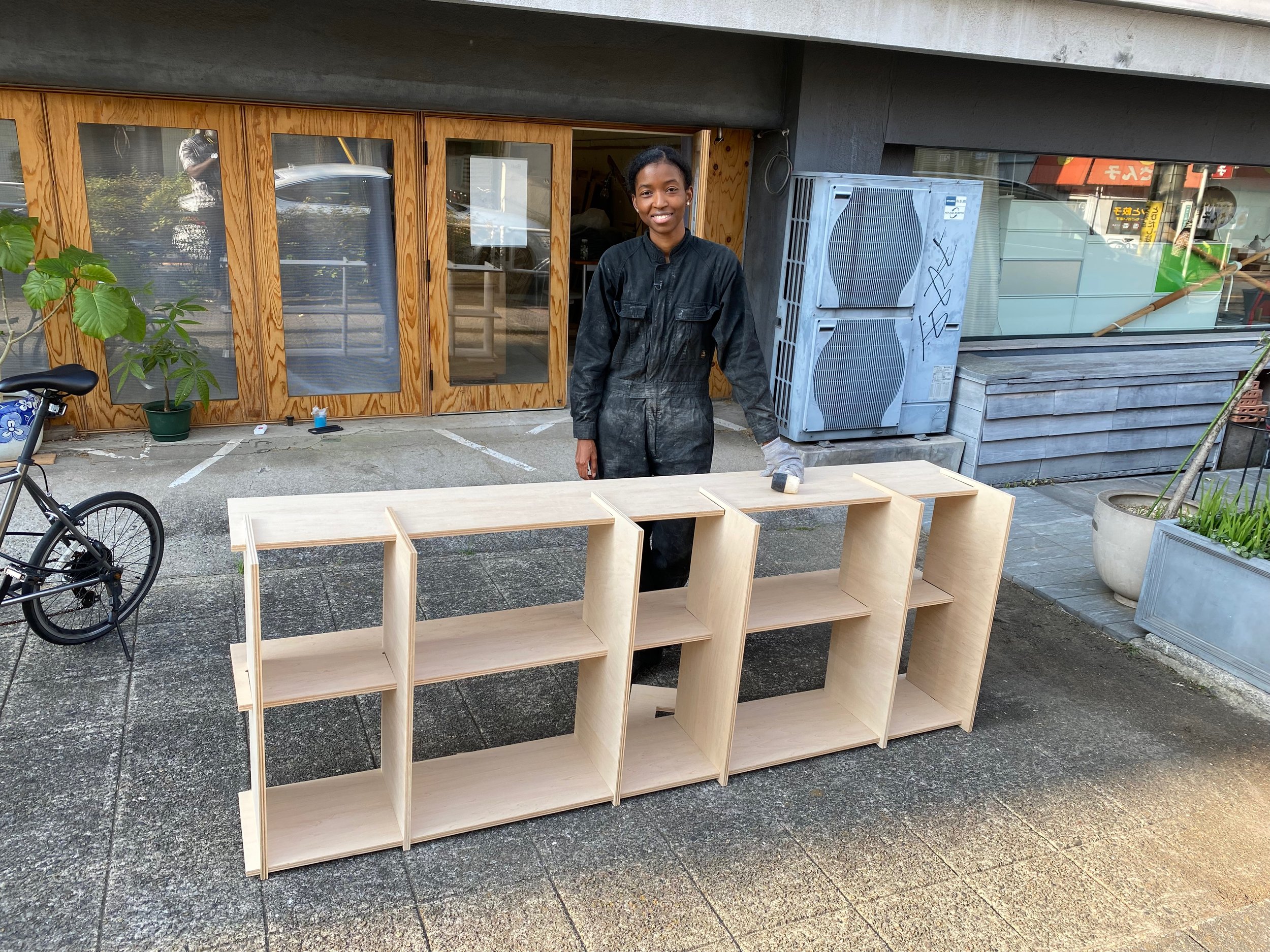
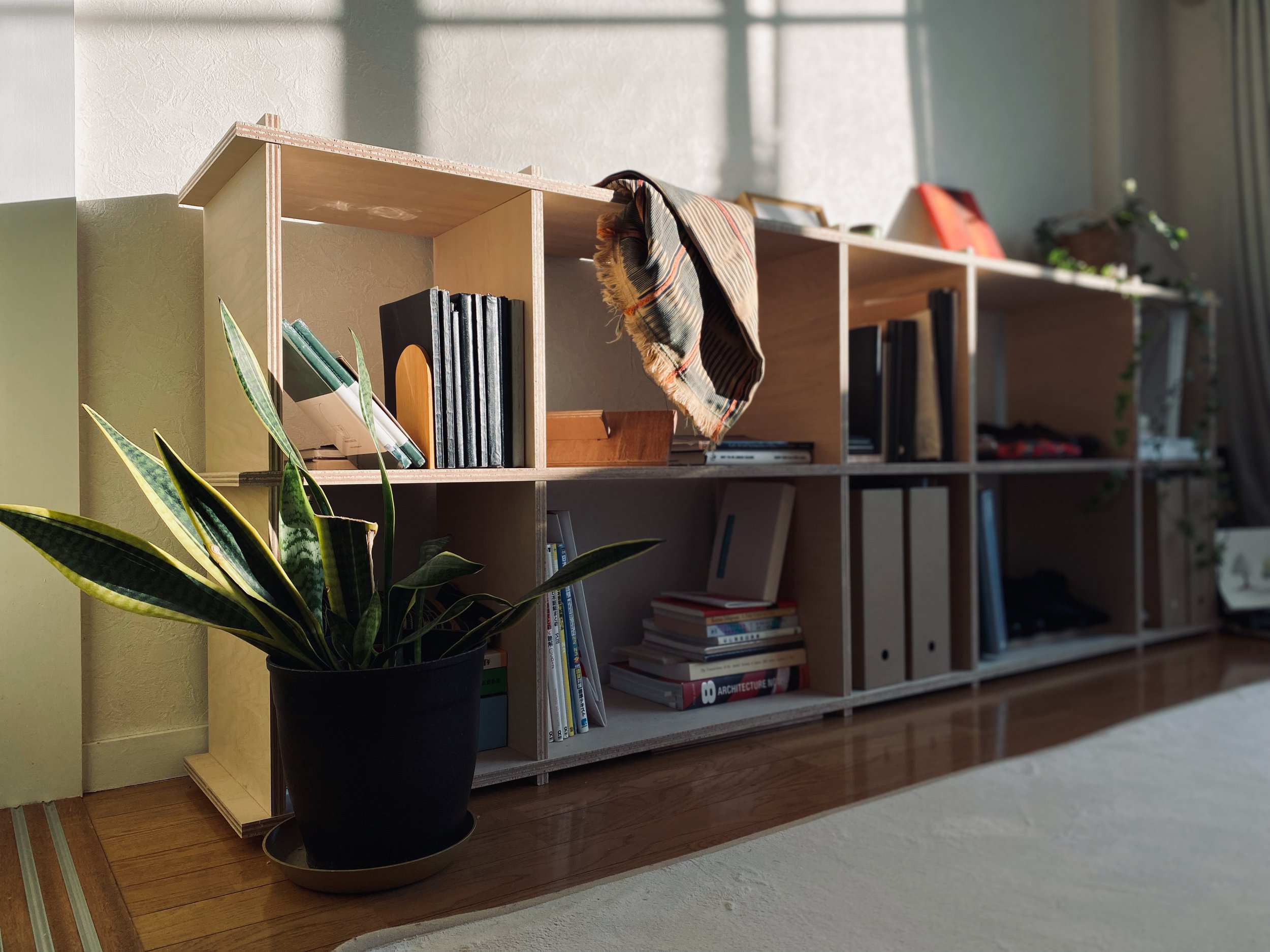
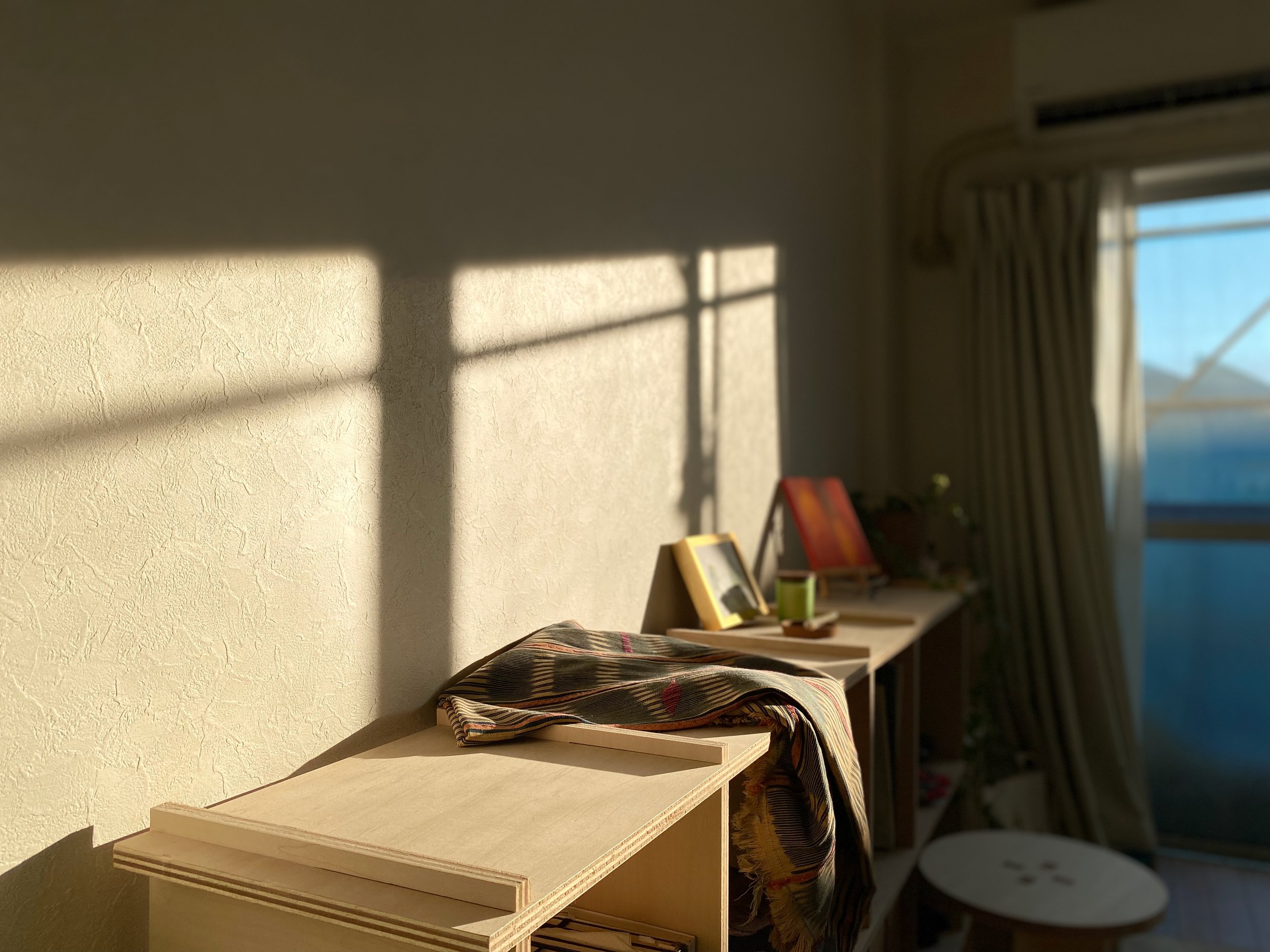
I think it would take another blog post to explain how I learned the skills I used to make the three stools and bookshelf I now have in my apartment. But I have my time at Keio University to thank for it. I also think I’d need to write a separate article to explain the process of designing each and how the space I live in dictated their outcomes. I can say, they follow the dos and don'ts of tiny living that I mentioned earlier.
Light-Coloured Wood
In this case, high-quality furniture-grade ply made from Linden wood.
A form and assembly driven by function, meant to display the technology used to make them.
Leaving the ridges on the surface, rather than making it a continuous level counter-top type, invites questions. Exposing them creates opportunities to explain how the shelf was made with slotted joinery, without nails, screws, or glue.
Dimensions
The length, height, and depth of the shelf and my stools were determined by the proportions of my own body, the size of the rooms they would be used in, and their relationship to furniture I already had in these rooms.
No backboard
For visibility of the wall behind it, making the presence of the shelf more subtle. Important in a small space. It’s more flexible without a front and a back. It has no defined direction.
Without a back, it can be used in the middle of a space, not just against a wall.
So,
Do I have a Style?
If I do have a style, it is guided by my process. A process of responding to real-world conditions.
In one case, I might measure the length of my thigh and calf to determine the diameter for the seat and height of a stool. In another case, I might measure the distance from my bed to an opposing wall, to tell me the maximum depth for my bookshelf. That is, a depth that would leave me space to walk in what I feel is a comfortable way.
Maybe it’s all not as logical as I think. I’m sure a lot of it is visceral. Tenets of modernism aside, I love wood. The fact that modernism demands that we expose materials instead of hiding them could be just a happy coincidence.
If I had a different space, in a different country, I’m sure the aesthetic would be very different from the one I’ve slowly developed here. While I am definitely not a minimalist, I’m also really uncomfortable with excess and clutter.
My style is more like a base formula. With different variables, there’ll be different results. With the combination of my tendency to respond to circumstance and to only want what’s necessary, I’d dare to hope that my style could be called appropriate.
I was born and raised in Jamaica, where my journey to becoming an architect began. I’m currently an architectural designer at Japan’s largest architectural firm.
Check out Annabell's episode on Flourish in the Foreign here.
Watch the IG Live featuring Annabell here.
Have some insight to share? Drop your comments below and let’s continue the conversation.
Found this helpful? Be sure to share with your friends!
Top Podcasts of 2021 Produced By & For Black Women Living & Thriving Abroad
Black women have been moving and living abroad since the beginning of time. Here is a list of the top podcasts of 2021 produced by and for Black women living & thriving abroad!
Want to move abroad? Subscribe to & give these podcasts a listen!
Picky Girl Travels the World
Adalia Aborisade is a veteran educator, world traveler, and serial ex-pat. After reaching financial independence on a teacher’s salary, she packed up her then 15-year-old daughter, canine sidekick, and sewing machine for a move to Honduras and has never looked back. Since her initial leap abroad, she has lived in Kuwait, China, and now is based in Mexico City, Mexico. Listen to her story here.
Her podcast, The Picky Girl Travels podcast was created for Black women who want more out of life. Join Adalia as she shares insights gained from creating a life of her own design, including how she made it happen on a teacher's salary. Expect to hear from women living life to the fullest by defying convention, embracing adventure, and most importantly, doing so with no regrets. https://www.pickygirltravelstheworld.com
Wonders of Wanders
Davida’s path to travel began with her grandmother’s Ananse stories under the starry nights of a Ghanaian childhood. Fusing this into a creative path, she pursued her undergraduate degree in Journalism and Communication Studies with French, and Master’s in Responsible Tourism Management. Davida currently resides in London. Listen to Davida’s story here.
Her podcast, Wonders of Wanders, is a feast of audio storytelling that brings the travel, food, and culture moments directly to your ears. https://www.wondersofwanders.com/podcast/
Kurly in Kansai
Ayana Wyse is a creative from the suburbs of New York. Living in Osaka since 2011 she has been involved in creating a community for the Black foreigners throughout Japan. She is the founder of the Facebook group and collective called Black Creatives Japan. Listen to her story here.
Her podcast, Kurly in Kansai (now ended), showcased her and her co-host’s, two Black women, experience living in the Kansai area of Japan. In the city of Osaka to be exact. https://www.kurlyinkansai.com
Flourish in the Foreign
I, of course, had to include my podcast, Flourish in the Foreign! I decided to move abroad to Spain after I completed the Camino de Santiago in 2014. I finally made the leap abroad in 2017, living in La Rioja and Barcelona. You can listen to my story of moving and living abroad here.
Flourish In The Foreign is a personal narrative podcast that elevates & affirms the stories & voices of Black women who live & thrive abroad. It also explores living abroad as a pathway to wellness, encompassing how financial, professional, physical, mental, and spiritual wellness is influenced by living abroad. https://www.flourishintheforeign.com
The Global Chatter
As a third culture kid, Amanda Bates’ interest in navigating cross-cultural spaces and identity started young. Her American-born, African-raised perspective continues to have an influence as she provides the creative direction behind The Black Expat to reflect the nuances of black international living and tell the stories that need to be told. You can learn more about her story here.
Her podcast, The Global Chatter is a conversational podcast on international mobility, identity, race, career, and more. Each episode takes a deeper dive into issues related to the expatriate experience, especially as it relates to Black and Brown people. Come for the commentary. Stay for the laughs. https://www.theblackexpat.com
Wine School Drop Out
Tanisha Townsend is the Chief Wine Officer of Girl Meets Glass, a wine lifestyle and education agency. She currently lives in Paris, France where she creates wine and food pairing experiences for ex-pats and tourists, hosts a wine podcast named Wine School Dropout, and teaches wine courses at universities in Paris. You can learn more about her journey abroad here.
Wine School Dropout, a bi-weekly podcast that teaches you everything you want to learn about wine but are afraid to ask. #nodegreenecessary. Produced by Studio Ochenta. https://www.wineschooldropout.com
All Things Iceland
Jewells Chambers is an engineer by training but is a career digital strategist. Her All Things Iceland platform encompasses a youtube channel, Instagram page, and a podcast, where she shares Icelandic news, traveling within Iceland, and her life in the country. Learn more about her story here
The All Things Iceland podcast gives travelers the inside scoop on Icelandic culture, nature, history, and language through the eyes of an ex-pat. You'll hear interviews, quirky facts, useful travel advice, and what it is like to live in the land of fire and ice. Additionally, there is a segment of the show dedicated to teaching you an Icelandic word or phrase. https://allthingsiceland.com
(A)broad in Education
Tiffany Smith is an educator with over a decade of domestic and international teaching experience. She had the opportunity to teach in Casablanca, Morocco, and Abu Dhabi, United Arab Emirates (UAE). Currently, she is a fifth-year doctoral candidate in the Department of Organizational Leadership, Policy, and Development at the University of Minnesota, Twin Cities. Her dissertation study focuses on teacher attrition through African American educators who left the US PK-12 system for teaching opportunities in the UAE. Learn more about her experiences abroad here.
(A)broad in Education is a podcast on a mission to (dis)cover routes (roots) through conscious conversations about EDpats. Edpats are expatriates working in schools outside of their home countries. https://www.abroadineducation.com
Burn Bright
Kelley Anne Bonner is a highly sought-after lecturer and organizational strategist who has dedicated her career to researching and addressing the effects of trauma, burnout, and psychological safety in the workplace. Drawing on over 15 years of experience in both the U.S. and Europe, Kelley developed Burn Bright’s multidisciplinary approach to meet both the immediate and long-term needs of clients in high-performance fields like biotech, elite higher education, and Fortune 500 companies. Learn more about her life in England and Italy here.
Her podcast, Burn Bright, is dedicated to helping you keep your personal and professional radiance. Every week she discusses how to prevent burnout, the right way to build a good self-care routine, and how to build a support network that lasts. https://www.burnbright.com
Chronicles Abroad
Nubia Younge was called to the nomadic lifestyle 3 years ago when she decided to leave the United States on a one-way ticket to SouthEast Asia. Throughout her travels, she has lived on 3 continents and explored 43 countries. Nubia's passion for travel and the knowledge that she's gained in each country, inspired her to start a travel consultant business. Learn more about her here.
Frantzces Lyss is a Theracoach helping women heal the conflict within so they can reignite their joy. She is the creator of Defying Resistance. A blog that inspires people to move past the resistance in their lives so they can live a life with meaning and purpose. Learn more about her story abroad here.
Their podcast, Chronicles Abroad, uses travel to highlight stories of personal growth. They’re just two middle-aged, single, empty nesters who decided to start a podcast about living, working, and traveling abroad. They spotlight the stories of courageous world travelers, creative wanderers, and digital nomads who share their incredible experiences of the world through their eyes. https://www.chroniclesabroad.com
The Purpose of Money
Acquania Escarne is a Wealth Strategist who helps clients build and maintain generational wealth through saving and investing. She has lived and worked abroad in Haiti, Dubai, and Ecuador with the US Foreign Service. Check out her tips for building wealth abroad.
Her podcast, The Purpose of Money, shares financial tips, advice, and stories from women on the journey to break free from the golden handcuffs. Each interview has valuable tips on how to create freedom, time, and wealth in your life now. https://www.ThePurposeofMoney.com/podcast
Loose Change
Deanna Denham is a full-time graphic designer and lived in Hong Kong with her husband and two daughters before returning to the US. Learn more about her time abroad here.
She started her podcast, Loose Change pod, while living in Hong Kong. She says of the podcast, “ I’m learning just how much I can be pulled, stretched, challenged, and broken and somehow keep raising 2 kids. Change is hard, but so is being human. And if you’re changing too, meet your new accountability partner!” https://www.loosechangepod.com
The Jackie O. Life Presents Black Women Doing the Most
Jackie Omotalde has been crisscrossing the globe for the last 20 years. She was one of the original Black digital nomads. She has lived long-term in 7 countries and worked and/or traveled to over 70 countries. She is currently slow traveling the world with her toddler, Ruth.
Her podcast, Black Women Doing the Most showcases interviews and offers advice and tips on moving abroad or traveling full time. https://thejackieolife.com
Enterprising Expat
Patricia Qhobela-Jenkins was born and raised in the UK with Lesotho roots. As a serial ex-pat, she has converted her experience as a “trailing spouse” into reclaiming her identity and starting her own podcasting business. Learn more about her time abroad here.
Her podcast, The Enterprising Expat creates a community for women who have left their “passport countries” and are faced with the challenge of rebuilding their lives - over and again in new places. https://www.theenterprisingexpat.com
Black Women Travel
Wanda Duncan is a superfan of Black women travelers. To that end, she's created a Facebook group, a podcast, a conference, and a creative services agency that all center and empower Black women travelers. Wanda tried and failed to leave the States in 2010 to work and travel online as a digital nomad, and for the past five years has been doing that and much more. Listen to her story here
Her podcast, Black Women Travel, shares the stories of Black women who dreamed to make travel a priority. This community of bold women from all over the world have varied travel stories including short-term travelers based in a country, to long-term travelers living as digital nomads or working abroad. https://www.blackwomentravel.com
Young Gifted & Abroad
Danielle G.’s interest in experiencing more of the world began when she was a child. She set her sights on France in elementary school and on Japan in high school, and she was fortunate to achieve those dreams by studying abroad in both countries as an undergraduate student.
Her podcast, Young, Gifted, and Abroad is an interview podcast that launched on Juneteenth, 2018. Each episode features a person of color who has studied abroad or had similar international experiences as a high school, undergraduate, or graduate student. No matter the type or duration of experience, the goal is for these stories to inspire current PoC students (and non-students alike) to take advantage of opportunities to see more of the world. https://www.younggiftedandabroad.com
Homegrown Podcast
Marie- Louisa Awolajaa is a race-strategy implementation manager in a legal firm and currently resides in Hong Kong.
She co-hosts the podcast, Home Grown. It was created to inform, inspire and entertain with personal stories of Black ex-pats. Each week a wide range of Black guests discuss their experiences living, loving, and working abroad. https://www.homegrownthepodcast.com
Abroad & Co.
Candace is a travel blogger and ex-pat, based in London. She shares weekly doses of travel inspiration with practical information on all things across the pond,
Her podcast, Abroad & Co., is designed for millennials intent on seeing the world, ditching the status quo, and becoming global citizens. Every week as she gets candid with ex-pats around the globe, sharing their stories & realities of living abroad. https://www.abroadandco.com/
Have some insight to share? Drop your comments below and let’s continue the conversation.
Found this helpful? Be sure to share with your friends!
Navigating the Process of Moving Abroad and Working Remotely
The article is discussing two questions from the ‘Flourish in the Foreign’ Instagram page related to moving abroad. The first question asks about what to look for when doing an exploratory trip before moving to a new country, and it is suggested that people should do as much as possible to experience daily life and try to check off items on the "Moving Abroad with Intention" guide. The second question asks about how to move abroad while working remotely for an American company.
This Week’s Instagram Questions:
“When you are doing an exploratory trip, what are some things you should be looking for”?
This is something that we cover and discuss in greater depth in the Moving Abroad with Intention course. I recommend that if you have the opportunity to do an exploratory trip, “look-see” or “recce” (short for reconnaissance) that you do all the things you expect to do in your day-to-day life (or as much as possible). A great starting point is if you’ve downloaded the Moving Abroad with Intention guide, take the final “country selection” page and utilize that as a “to-do” list for your trip. You should try to experience all of the things that you like, desire, and require to get a greater understanding of the city that will be a good fit for you.
“I currently work for an American company remotely, how would I be able to move abroad”?
Honest answer, I don’t know and I invite anyone that has successfully navigated that situation to write about it on the blog. My situation was very different, I secured an “anywhere in the world” remote position while living in Barcelona. The company is based in D.C. and so I never had to negotiate moving abroad with them.
If I were in your shoes I would do two things:
1) Decide on a country that I’d want to move to. Then investigate their freelance visa or digital nomad visas. Understand the requirements and the type of employment that is allowed within each visa class.
2) Then approach my employer with my desire to move abroad. Showing them how they would have to do minimal to support me and demonstrating that I would run point and could get this done without disruption to my work. I’d also investigate any tax liability that my company might open itself up to by allowing me to work abroad and how that might be mitigated. I believe a big reason why some companies have a US-remote-only policy is due to tax exposure.
Have some insight to share? Drop your comments below and let’s continue the conversation.
Found this helpful? Be sure to share with your friends!
Establishing Yourself as a Resource: How to Network for Remote Work Opportunities
Figure out what you want to do or at the very least make a detailed list of all of your marketable skills. Don’t tell me (or anyone else for that matter), that you’ll “do anything, anywhere.”
How to Find & Negotiate Remote Work with American Companies?
This is a pretty common question that I receive and if you’ve listened to my episode on the podcast, you learned about how I got abroad and how I continually “flipped” opportunities into remote jobs abroad. My situation was different than how this question is typically posed because I didn’t work or seek to work for a company and then negotiate with them to work remotely. I already lived abroad and networked my way into a full-time job with an American company based in D.C.
So, my advice is simple: Network
Before you roll your eyes at me, hear me out!
Networking is simply building relationships, that’s it, that’s all. Don’t make it deeper than it is!
People who are great at networking establish themselves as a resource to others. Thereby demonstrating their expertise and skills, but also continuously building relationships.
Networking may not land you a job, but it may put you in a position to pitch yourself as a solution to some company’s problem (with the stipulation that you work remotely).
So what are your first steps?
Figure out what you want to do or at the very least make a detailed list of all of your marketable skills. Don’t tell me (or anyone else for that matter), that you’ll “do anything, anywhere.” That’s not true and that doesn’t help anyone who’s rooting for you to actually assist you. It won’t make them think of someone specific within their network you should link up with and it doesn’t narrow the field of your own search. You will burn yourself out being so abstract. Remember specificity reigns supreme! Narrow it down even if it’s just to get informational interviews or as a starting point for you to gather data to see if you really want to go down a particularly marketable skill “route”.
Develop a profile, reputation, and/or professional brand that aligns with what you want to be hired to do. Showcase your skills and expertise. Showcase your ability to work remotely/independently within deadlines and/or across time zones.
Then tell people! Go through your network and see who is working in that field or country or company. Identify companies that you’d be interested in working with and identify how they recruit (outside recruiting agency or internal HR) and introduce yourself. This way your efforts will most likely yield more and better quality results and opportunities. I also recommend listening to the How to Get a Job Abroad episode of the podcast and watching the AMAZING video I did with Itiah Thomas about taking your career abroad!
This video is about how to make a successful career transition abroad, featuring past Flourish in the Foreign guest, Itiah Thomas. Itiah is an American woman who used to work in commercial construction project management in the US, but moved to Australia to pursue a career transition and explore living abroad as a pathway to wellness. She talks about her experience of leaving the US, traveling for 8 months to find a new home, settling in Australia, how she secured a job in her career field in Australia and how she negotiated Australian residency into her compensation package. She also talks about the importance of professional and financial wellness in relation to living abroad.
This episode of Flourish in the Foreign focuses on the topic of getting a job abroad and features Christine's, host of Flourish in the Foreign, personal experience and advice on how to be strategic and network effectively in order to secure opportunities. It covers getting a job via headhunters, staffing agencies, job boards, networking, and leveraging competitive advantages. It also shares insights about earning a degree abroad as a way to enter a country's job market and create entrepreneurial opportunities. It also features the stories of how past podcast guests got jobs abroad:
Working as an International Recruiter in Jordan
Working as an Architectural Designer in Japan
Working in Social Work and Counseling in Italy
Working as a Graphic Designer in Hong Kong
Working in Marketing in Iceland
Working in Construction Project Management in Australia
Working in International Higher Education Around the World
Working in Bio-Tech in the Netherlands
Working in Digital Marketing in Portugal
Have some insight to share? Drop your comments below and let’s continue the conversation.
Found this helpful? Be sure to share with your friends!
Moving Abroad: Coping with a Lack of Roots through Community and Routine
To be rooted, for me, isn’t designated to a place, but rather a sense of self. I’m always deeply rooted wherever I go because I know who I am, and who I am evolving into and I move in alignment with that knowing.
Although I have had stints of being a digital nomad, I definitely don’t consider myself nomadic. I consider myself an ex-pat looking to be an immigrant somewhere lol. Truthfully, I’ve never felt as if I wasn’t rooted. To be rooted, for me, isn’t designated to a place, but rather a sense of self. I’m always deeply rooted wherever I go because I know who I am, who I am evolving into and I move in alignment with that knowing. I have, however, felt “unsettled”. As a type-A, Capricorn introvert, I’m definitely a home-body and I like routine. Even when I’m nomadic, I quickly create a routine for myself. So when I feel “unsettled” I know that I need to look outward for support and community. It requires effort and participation in the world and a community to develop a sense of belonging, familiarity, “settledness” and perhaps for some “rootedness”. I’ll also add that my friends and family travel (and live abroad) so I don’t feel as if my community, my people, or my belonging is ever tied to a single place.
Have some insight to share? Drop your comments below and let’s continue the conversation.
Found this helpful? Be sure to share with your friends!
Letting Go: Overcoming Emotional Attachments to Possessions When Moving Abroad
So, you’ve decided to leave your things behind. That might mean that you’re selling some items, donating some items, storing some items, or throwing them away.
How To Detach From Your Stuff, So You Can Leave It Behind & Go Abroad?
So, you’ve decided to leave your things behind. That might mean that you’re selling some items, donating some items, storing some items, or throwing them away. I completely understand being attached to stuff! Being raised in a hyper-consumer culture, stuff means comfort and stability. But stuff also contains energy, the energy of past situations and memories. Regardless of how nice those things are or perhaps how nice the memories that encompass them are, you’ve got to understand that in order to create something you’ve never experienced before you have to do things differently. You have to make room (physically and energetically) for a new life to be drawn in.
So perhaps you start with Marie Kondo’s method of evaluating your stuff and go from there!
Marie Kondo's method, also known as the KonMari method, is an approach to tidying and organizing possessions by categorizing them. The method includes five categories: Clothes, Books, Papers, Komono (Miscellaneous Items), and Sentimental Items. Identifying the main categories under which most items fall, can help increase the speed at which you can pile everything together.
Marie Kondo encourages tidying by category. Starting with clothes, then moving onto books, paper, miscellaneous items, and sentimental items. The decision-making process is simple, you keep the things that spark joy or speak to your heart and discard the things that do not.
the KonMari method is useful for people moving to a new home, as it can help reduce the packing and moving load. By following the KonMari method, you can declutter your home and make it more organized, thus making it easier to pack up and move abroad.
Will you miss your stuff?
If you can’t get the equivalent in your new country then, yeah probably.
But you’ll most likely forget about it until a very exacting situation arises (“damn it, if only I had my purple glitter pen with the feather on top!!” or something like that).
Though some things you’ll miss more routinely. For me, it’s a pair of jean shorts that I cut myself from a pair of Goodwill jeans. Those jean shorts fit SO WELL and were so cute! I guess I could make some more, but I’m not super crafty, so it feels like it was a fashion fluke (hence my ongoing angst).
Have some insight to share? Drop your comments below and let’s continue the conversation.
Found this helpful? Be sure to share with your friends!
The Moving Abroad Conundrum: Deciding What To Do With Your Possessions
Should you really only take 2 suitcases abroad?
Look, you can do whatever you want! You hate to hear it, but it truly depends!
Should you really only take 2 suitcases abroad?
Look, you can do whatever you want! You hate to hear it, but it truly depends!
It depends on how you envision your life abroad. It depends on if you have the budget and patience to ship all of your worldly possessions around the world.
It depends on if your target country will accept your items into the country.
It depends on if your stuff will be able to be maintained in your target country’s climate (think new bugs, possible heat, humidity, or cold).
It also depends on if your stuff will even fit inside your new home! Let alone the door frame or window, but actually in your bedroom or living room. Will your stuff fit? Different cultures and countries have different size expectations for homes.
We go into this in detail in the Moving Abroad with Intention course, but it comes down to this: what does a life well-lived abroad look like to you? What are the reasons for you moving abroad? Is hauling all of your belongings to another country in alignment with that vision? No one can answer that question for you, it’s truly up to you!
Moving Abroad Checklist:
Things to Bring:
Valid passport and visa/work permit
Airline tickets and important travel documents
Financial documentation (bank statements, credit cards, emergency cash)
Medications and copies of prescriptions
Travel insurance policy
Essential clothing and shoes
Personal hygiene items
Important electronic devices (laptop, phone, camera)
Power adapter and converter
Essential documents (birth certificate, marriage certificate, diplomas, etc)
Contact information for family and friends
Not easily replaced valuables (jewelry, expensive watches, etc)
Food items that are not easily replaceable (spices, etc)
Things Not to Bring:
Illegal items
Hazardous materials (chemicals, flammable liquids, etc)
Unnecessary excessive clothing, shoes, etc
Items that are illegal in the target country
Items that are unnecessary for your lifestyle in the target country
Expensive or sentimental items that can't be easily replaced in case of loss or damage
Items that are bulky and hard to transport
Items that are hard to maintain in the target country (for example, certain plants)
Have some insight to share? Drop your comments below and let’s continue the conversation.
Found this helpful? Be sure to share with your friends!
How to Handle a Visa Denial
This obviously depends on 1) the circumstances of your denial and 2) your timeline to leave.
Regarding the circumstances of your denial: what were the grounds of your denial? Find out if this is typical for the country and visa class you applied for?
What To Do If Your Visa Is Denied?
Well, I’ve never experienced this, but the lawyer in me says to go hire a lawyer!
This obviously depends on
1) The Circumstances of Your Denial
2) Your Timeline to Leave
Regarding the circumstances of your denial: what were the grounds for your denial? Find out if this is typical for the country and visa class you applied for.
Was it denied on a technicality?
Maybe your documents are “expired” (some countries only accept documents that have been issued within a certain time period).
With a technicality, you might be able to remedy the issue by quickly submitting the necessary documentation or you may have to re-apply (knowing that you most likely will receive the visa).
Was it denied on a material fact or issue?
Meaning your visa was denied because you lacked an essential element to qualify for the visa class. Perhaps the visa class you applied for has a requisite 25,000€ minimum bank balance that must be shown. However, you applied with documentation showing that you have a 5,000€ bank balance.
With a material issue, you probably need to go back to the drawing board and re-think the visa and/or country you are applying for. I think utilizing a trusted and seasoned attorney in immigration issues of your target country will be able to advise you on what your available options for remediation might be.
Also regarding your timeline, in many countries, attorneys have access to expedited channels that people filing on their own do not have access to. So if you have a strict timeline, then you’ll definitely want to get an attorney involved.
Have some insight to share? Drop your comments below and let’s continue the conversation.
Found this helpful? Be sure to share with your friends!
Get Specific: How to Ask Better Questions about Moving Abroad
Asking general questions will garner general responses. I know you may feel like you don’t have enough information to ask specific questions because you haven’t decided on a country, let alone a visa, but I’m here to push back and tell you that, in fact, you truly know enough to stop asking generic questions (and then have the audacity get mad when you receive an “it depends” response)!
Asking general questions will garner general responses. I know you may feel like you don’t have enough information to ask specific questions because you haven’t decided on a country, let alone a visa, but I’m here to push back and tell you that, in fact, you truly know enough to stop asking generic questions (and then have the audacity get mad when you receive an “it depends” response)!
Specificity Reigns Supreme, in both your current life and in the life you are hoping to cultivate abroad. You know (maybe in painful detail) the things that are not working in your life currently. You absolutely have very particular ideas of things you would prefer NOT to experience abroad. Therefore you more than likely know a lot more about the type of place you are truly looking for.
In fact, you probably have very strong preferences if you actually took a moment to be still and honestly listen to yourself.
Questions like “where can I live where there’s a beach and good education” are wildly abstract, will not elicit quality responses, and in fact may exhaust people who are sincerely trying to help you!
Like, what kind of question is that, ma’am!? What?! You do know Japan, New Zealand, Germany, even the Netherlands all have beaches right? What does a “good education” mean to you? And for whom? Yourself, a child? Specificity is supreme!
Let’s get real, you undoubtedly have definitive preferences in life. It would be hard to go through life, accumulate experiences, and NOT have developed any tastes or inclinations. So let’s first admit that you in fact have preferences in this life and that you most likely have pretty strong ideas about what life abroad means to you. I mean, why else would you just decide to uproot yourself and plunk yourself into an unfamiliar country?
If you’re still screaming, “No, Christine, I have absolutely no clue, no preference in going abroad, all I know is that I want to.”
Well, well, therein lies all of your answers that you claim not to know!
Why? Why do you want to go abroad?
What are you hoping to experience while abroad?
What are you hoping to be different about your experience abroad?
THERE! THERE is your preference (even if it’s just a sketch) and also THERE is the seedling of specificity.
The fact that you know what you do not what to experience, or what you would prefer to experience is the specificity that will garner better advice and less frustration on your part!
If you haven’t already, grab the Moving Abroad with Intention guide to gain the clarity needed to start asking better questions, but also the clarity you need to really build a game plan that will lead you to a thriving and sustainable life abroad.
Flourish in the Foreign’s Move Abroad with Intention Guide
Oftentimes, we keep our plans loose as a result of past experiences. We’ve learned to be flexible and accommodating, which is all nice in theory. But what if we’ve been habitually prepared for disappointment and hardship? If we have been conditioned to anticipate the worst-case scenario of never getting what we ever truly wanted? Then you’ve probably never taken a moment to consider what you truly desire, require, or prefer. As a result, you won’t allow yourself to fully imagine, contemplate or even expect that your needs, let alone your desires will ever be met. So you stick to the abstract, always knowing that whatever happens, you’ll be able to figure it out. Which is an excellent attitude to go abroad with, and will serve you well when unexpected things happen. But in this stage of imagining and researching, this attitude defers your wants and your vision of a life well-lived to others. You know more than you give yourself credit for and if you would allow your true desires, ideals to breathe you may actually find what you’re looking for.
So before you go into inquiry mode, breathe and give yourself the space and time to dream so that you can articulate your preferences. Then fully embody these preferences: what would it feel like if I lived within my preferences? Try it on, instead of preparing yourself to always conform to disappointment and “good enough” situations, start with what you actually want. NOT what you think you can get, start with your ideal and allow yourself to hold everything else up to that standard!
Have some insight to share? Drop your comments below and let’s continue the conversation.
Found this helpful? Be sure to share with your friends!
From Tokyo to Leipzig: How Studying Abroad Led to Living Abroad
Many of my guests have studied abroad and have utilized that experience to continue living abroad, myself included. I studied abroad in Valencia, Spain during undergrad and now 10 years later I live in Spain and have been living here for the past 5 years.
Here is a selection of the episodes that feature study abroad experiences.
Many of the Flourish in the Foreign guests have studied abroad and have utilized that experience to continue living abroad, myself included. I studied abroad in Valencia, Spain during undergrad and now 10 years later I live in Spain and have been living here for the past 5 years.
Here is a selection of the episodes that feature study-abroad experiences.
Annabell
Earning a Master’s in Architecture in Tokyo
In this episode of Flourish in the Foreign, Annabell, a Jamaican woman who currently lives in Tokyo, Japan, shares how she first went abroad when she was 19 to Saint Kitt's and fell in love with traveling. She studied architecture in Jamaica and participated in study tours to other Caribbean islands. After graduating, she participated in an urban planning and design summer school in Finland and was struck by the unfairness of how easy it was for native English speakers to understand the content compared to non-native speakers. She then committed to learning other languages and reaching out to people from other countries, as she felt it was an extension of imperialism for the rest of the world to have to adjust to English. She decided to move to Japan to teach English and earn money to pursue a Master's degree in architectural design. Annabell shares her experiences studying at Keio University, interning in Nepal, and adapting to the infamous Japanese work culture in Tokyo.
Getting a Master's in Architecture Abroad with Annabell
Jackie
Went abroad at 16 years old to Germany. Studied abroad as an undergrad in France and Spain.
Jackie is a 41-year-old serial digital nomad and slow mad currently living in San Pedro La Laguna, Guatemala. She left home to live abroad for the first time at the age of 16. She grew up with an international and diverse background, with an African-American mother and Nigerian father, and was exposed to travel and different cultures from a young age. She went to Germany for a year through a program partially funded by the U.S. Congress and the German Bundeslag. She had an amazing experience learning German and traveling around Europe. This experience convinced her that she wanted to spend more of her life abroad and that her race didn't just define her life. She then went to Spelman, a Historically Black College, and continued to live and travel abroad.
How to Go Abroad as a Single Mother & Digital Nomad with Jackie Omotalde
Rachel
Jamaican woman who earned her undergraduate degree and law degree in the US. Studied Abroad in Buenos Aires, Argentina & Bilbao, Spain. Worked on the Mau Mau reparations case in Kenya. Then earned her Ph.D. in Barcelona, Spain.
Rachel Victoria Brown is a Jamaican woman living in Barcelona who has traveled to 30 countries. She moved to the US to attend boarding school in Hudson, Ohio at the age of 16, where she experienced culture shock and struggled to adjust to the predominantly white, wealthy community. She went on to attend the University of Southern California for her undergraduate studies, where she was involved in the Black community and learned about African American culture and traditions. Rachel has also studied abroad in Buenos Aires, Argentina, Bilbao, Spain, and Barcelona, where she earned a Ph.D.
Pursuing a Ph.D. Abroad with Dr. Rachel Brown
Nia
Fine Artist whose career prospects changed by her earning an M.F.A in Qatar.
Nia Alexander Campbell is a 23-year-old woman from Richmond, Virginia, currently living in Doha, Qatar. She talks about her undergraduate experience and her study abroad experience in Morocco. Nia decided to earn her MFA abroad in Qatar and she talks about her first year of studying. She said that her growth as an artist and designer has been unlike anything she has experienced before. She also mentions that her relationship with her family has grown stronger since she left the US.
Earning a M.F.A. in Qatar with Nia Alexander Campbell
Dana
Earned her Master’s in Sociology in Amsterdam
Dana, the founder of Ancestors unKnown, an education social enterprise, talks about her journey of studying and launching a business abroad. She earned a Master's degree in Sociology in the Netherlands, where her studies focused on the significance of family history research among people who descend from survivors of slavery. She revealed both shared and divergent experiences among Black people throughout the African diaspora. She then moved to several cities such as Amsterdam, Paramaribo, The Hague, and Bristol where she is currently based
Listen as she shares how her life changed once she started "thinking about the whole world as an option" for her.
"Ancestors unKnown" with Dana Saxon
Maya
Studied abroad in the Dominican Republic in undergrad. Earned a Masters in Public Health in Paris and conducted research in Australia.
Maya a California-bred adopted Parisienne who has been living and thriving in Paris for the past 10 years shares her journey of going abroad. She is an entrepreneur, public health consultant, and travel consultant who has traveled to over 35+ countries and lived abroad for a total of ten years. She has a wealth of knowledge and resources accumulated from her years living as an ex-pat and she has a passion for helping individuals and businesses create their own life-changing experiences abroad, ranging from planning an itinerary for the first-time Paris visitor to providing insights for those pursuing Master’s studies in Paris.
Purchasing a Home in Paris with Maya Dorsey
Amanda
Earned a Master’s in Counselor’s Education in Qatar
Amanda Bates is the founder of "The Black Expat" a website and resource for Black people living and thriving abroad. She is a third-culture kid who grew up in multiple places. She talks about her background and experiences as a Black woman living abroad, her family originally came from Cameroon, a country in Western Africa, and how her parents came to the US for better education and opportunities, but later decided to return to their home country. She also mentions how common it is for first and second-generation African and Caribbean immigrants to come to the US for a better life and education and then want to go back to their home country to contribute to its development. Amanda also talks about how moving back to Cameroon at the age of 10 with her parents was difficult for her, as it was a big change and how living in the US can be hard for immigrants who are away from their family, culture, and what they know.
From Third Culture Kid to "The Black Expat" with Amanda Bates
Latrese
Studied Abroad for her MBA in Leipzig, Germany.
Latrese Williams is a 44-year-old woman from Chicago, Illinois who moved to Rome, Italy. She studied at an HBCU, Clark Atlanta for her undergrad. She had an opportunity to study abroad during her MBA program, which opened her eyes to different cultures and sparked an interest in living abroad. She studied at Leipzig University in Leipzig, Germany, where she took classes on the conversion to the EU and traveled to different places in Eastern Europe. The experience of studying abroad gave her a new perspective on the world and showed her that there are opportunities to live and work in other countries.
A Whole New Dating World in Rome with Latrese Williams
Have some insight to share? Drop your comments below and let’s continue the conversation.
Found this helpful? Be sure to share with your friends!
International Women's Podcasting Awards: Flourish in the Foreign nominated for "Moment of Touching Honesty" category
Flourish in the Foreign, has been shortlisted for the inaugural International Women’s Podcasting Awards in the category of “Moment of Touching Honesty”.
Flourish in the Foreign, has been shortlisted for the inaugural International Women’s Podcasting Awards in the category of “Moment of Touching Honesty”. The awards are being presented by the Skylark Collective, whose mission is to help women achieve unprecedented success in their podcasting lives. The Skylark Collective is a global membership community for anyone involved in podcasting who identifies as a woman. The winners will be announced on September 23rd, 2021 in London at the Allbright Mayfair.
Due to the ongoing restrictions put in place because of the pandemic, I will most likely not be making a trip up to London for the awards ceremony. But the ceremony will be live-streamed, so you can all check it out.
You can listen to the piece that was nominated for the “Moment of Touching Honesty” award below. It features Khephra White whose episode was about her life in Madrid and how it has evolved over the past 7 years of being abroad. As a disclaimer, this piece does use strong language, so you may want to pop in your headphones.
I just want to thank you all so much for the love and support you have given me and the podcast. It is greatly appreciated and I hope I can bring this award home to y’all!
Why Starting a Business Abroad May Not Be Right for You: Considerations Before You Take the Plunge
Moving abroad can provide a variety of professional opportunities. I’ve written about some of the many considerations you should think through before starting a business abroad, now I’ll go over the reasons why starting a business abroad may not be for you.
Previously Published on TheBlackExpat.com
Moving abroad can provide a variety of professional opportunities. I’ve written about some of the many considerations you should think through before starting a business abroad, now I’ll go over the reasons why starting a business abroad may not be for you.
If You’d Really Prefer to Work for an Employer Abroad
Excellent business ideas and businesses may be formed by people who are unexpectedly laid off from their employer or simply out of necessity. However, if you would really rather be working for an employer abroad for financial stability or any other reason, that is valid and you should do that. You may have to be flexible on location, position, salary, or a whole host of other factors.
But if you’d prefer to work abroad with an employer, I strongly urge you to seek out a qualified headhunter or recruitment agency to make that happen. Too many people believe that finding a job abroad is or will be too hard so they think that entrepreneurship is the easy way forward. However, that is definitely not true for many. Making a business successful, acquiring and sustaining profitability is not necessarily easier than getting a job abroad. I’d only suggest embarking on entrepreneurship if it is your desire to leverage your skills and talents into your own venture.
If You’re Looking To Make Fast Cash
Entrepreneurship is not a get-rich-quick scheme; ask the people who seemingly have overnight success (read: just became more visible due to a major feature in a magazine or on social media or a television program). Even people who are met with immediate demand once they hang their shingle for business, know that demand and interest do not necessarily mean fast cash. Great sales often require the expenditure of funds to maintain or expand systems to deliver the products or services.
Many factors may take a ‘big bite’ out of your dreams of a fast cash endeavor, such as your overhead costs, like the cost of developing or manufacturing your product or service, delivery costs, marketing, and so on. Overhead costs could balloon directly with an increase in sales, which means immense sales don’t necessarily translate into immense profits, depending on your margins. Some profitable business owners don’t take a salary from the business for years because of the need to reinvest profits into the business to continue growing. Obviously, this is extremely dependent on the type of business you have, among other critical variables, but most legitimate business endeavors are not fast cash schemes.
Your Finances Aren’t In Order
If you are experiencing financial instability, I would not recommend starting a business abroad full time. It may be in your best interest to start with a side hustle, gain some financial breathing room, then try to go full time. Due to my aforementioned belief that most businesses are not and should not be thought of as get-rich-quick schemes, experiencing financial instability with the pressure of ‘having to make a business work’ is often too much for anyone to bear. It works for some people but not for others, therefore I suggest making sure you have a financial safety net (savings or a full-time job) that can support you and your family while getting started.
Low Tolerance For Risk
Entrepreneurship can be a gamble, there is some amount of risk you must be able to stomach. Depending on the venture and the investment required, you should ask yourself (or write up in a business plan) when you project:
-to break even (when you will recoup your initial investment).
-you will be profitable (making money in surplus to your cost of running your business).
-you will be able to pay yourself (for real).
Not everyone can withstand this type of uncertainty or can only withstand it for a specified amount of time (and not a day more). Even with the most carefully laid plans, the unthinkable can still happen – like a global pandemic, for example – so assess your and your family’s tolerance for risk to determine if launching a business abroad is for you. Perhaps determine a deadline for profitability that works for you, such as ‘if this business is not profitable, meaning making x dollars (and I’m able to to take x dollars out of the business to pay myself) by six months or one year, then I’ll find a job, go to school, pivot in some way’.
Unwilling to Pivot
If you’re unwilling to be responsive to the market, your business won’t succeed. Remember, you’re providing a product or service that in essence should solve a problem faced by your target market. Refusing to listen to the people you hope will become customers, take their feedback into consideration, or refine in a way that your audience requires will not be fruitful.
In addition to it being a poor way to treat prospective clients, you may lose out on valuable insights by being inflexible and also miss out on your next great business opportunity! So although you may have the next great big idea or you just know a certain business will really take off, if you are inflexible or unwilling to be molded by market feedback, if you’re unwilling to pivot your business to be responsive to the market, then you shouldn’t launch your business. A business is constantly iterating due to external factors like trends, audience taste, logistics, taxes… If you’re unwilling to be flexible then you will most likely break and business is not for you.
You Don’t Have A Clear Vision, But The Idea Of Having Your Own Business Sounds Appealing
I believe in having a well-researched and tested business idea. I don’t think a lot of people have the capacity to be able to move to a different country and fling themselves into entrepreneurship without a vetted idea, community support, or target-market knowledge. If you’re interested in launching a business but you’re not sure just what business it will be or you’re lacking clarity, don’t just fling yourself into it. I recommend taking more time to think about the problem you’re trying to solve and the people you want to service. Perhaps interview some of the people that you think are your potential target market to really assess their needs and desires.
Interested in Building a Business Abroad? Grab the Build a Business Abroad Guide
Have some insight to share? Drop your comments below and let’s continue the conversation.
Found this helpful? Be sure to share with your friends!
Build A Business Abroad: Key Considerations Part 2
More and more people are looking to live/work abroad, but preferably without being tied to a company or organization. In Part 1 of Building a Business Abroad, we looked at a variety of things to consider, including the type of business, infrastructure needs, visa requirements, language, and more.
Previously Published on TheBlackExpat.com
More and more people are looking to live/work abroad, but preferably without being tied to a company or organization. In Part 1 of Building a Business Abroad, we looked at a variety of things to consider, including the type of business, infrastructure needs, visa requirements, language, and more. Here, we build on that with a few more indispensable factors to be aware of if you’re thinking of starting a business abroad.
Intellectual Property
According to Black’s Law Dictionary (US law), intellectual property refers to a category of intangible rights protecting commercially valuable products of the human intellect. Some of these protections are copyright, trademark, patent, and trade secrets. Intellectual property rights (what is protected, how it is protected, and for how long it is protected) can vary from country to country. Understanding what steps you can take to protect your intellectual property in the country you’re doing business in is a necessary step in considering if you should start a business. Consulting a local attorney that specializes in intellectual property will be your best bet in getting the information you need to make an educated decision.
Labor Laws
If you plan to employ people from the local population, it is vital that you understand the local labor laws – what are the rights and protections afforded to you as an employer, and what are the rights and protections of your employees that you will be expected to respect. Consider what is a livable wage in the country, what are the laws around hiring and firing, what is a workday, and what holidays, traditions, and customs will need to be recognized.
Working Currency and Currency Exchange
It is equally important to consider what will be your working currency. With what currency will you purchase supplies, produce the product, pay contractors or employees, accept in exchange for your products or services, and use for business purchases, savings, and to pay yourself? If you will need to be exchanging currency frequently, it is important to have a currency exchange strategy so that you do not incur unnecessary fees or lose money in the exchange. Consider having a business account that holds multiple currencies and a bank that has low exchange rates and wire transfer fees.
Tax Exposure and Implications
As mentioned above, understanding what taxes you and your business will be subject to is an important consideration when deciding to start a business abroad. Consulting a licensed accountant in the local country and a licensed accountant with experience working with ex-pats with businesses will be your best bet to ensure you are well-versed in the tax implications of your business. It is also important to consult a licensed accountant to develop a tax strategy that makes sense for the type of business you have, your lifestyle, long-term residency goals and ensures you honor all tax obligations.
Target Market (Local vs Outward-Facing)
One of the foundational steps in developing a business is understanding who you will be serving, what you will be serving them, and how you will deliver that service to them. This is equally important when deciding to have a business abroad. Will your product or service be directed to the local market or a market abroad? This decision may affect the price of your product or service, how you market your product and whether you have an interested audience, and ultimately, a viable product at all. Not all markets have the same problems or are looking for the same solutions (or your unique solution). Cultural differences dictate what is deemed a problem, deemed a necessity, deemed a luxury, or deemed unnecessary. Once you have decided who your target market is, conducting the requisite target market analysis is key for a successful entry into the market.
Support Network (Local and Abroad)
Being a business owner can be a difficult and lonely endeavor, but especially when embarked upon abroad. Seeking out and cultivating a support network can make or break your business. Having a support network provides not only encouragement but also a community for you to ask questions, refer business to each other, gain understanding about cultural norms, taxation requirements, and more. Be sure to seek out community support both within your local community and abroad. A good place to start is the local chamber of commerce or equivalent and the local chapter of an ex-pat group, for example, the American Society of Barcelona. It makes a world of difference.
Moving abroad should always be embarked upon with intentionality and respect, but deciding to conduct business abroad should especially be approached with intentionality, respect, and a heightened sensitivity toward the local community. Consider how your business will affect the local community. How can your business be a positive influence within the community? How will you intentionally engage with the community? As a guest within a country, it is important to think and behave in a manner that is inclusive of the local community and has reciprocal benefits.
Interested in Building a Business Abroad? Grab the Build a Business Abroad Guide
Have some insight to share? Drop your comments below and let’s continue the conversation.
Found this helpful? Be sure to share with your friends!
Build A Business Abroad: Key Considerations Part 1
One thing the pandemic has made painfully clear is the fragility of global industries. For some ex-pats caught abroad on an employment contract that was suddenly canceled and forced to leave the country, there is an understandable desire for more stability or at the very least more control in their professional and financial future.
Previously Published on TheBlackExpat.com
One thing the pandemic has made painfully clear is the fragility of global industries. For some ex-pats caught abroad on an employment contract that was suddenly canceled and forced to leave the country, there is an understandable desire for more stability or at the very least more control in their professional and financial future.
This has led more and more people interested in living and working abroad to consider starting a business while abroad. Although I’m a huge advocate for entrepreneurship, I understand that it is not for everyone. Therefore I have created a non-exhaustive list of things you should consider before and during the process of starting a business abroad.
Type of Business
Online or Brick and Mortar. Deciding whether or not to have a digital business, be it services, digital products or drop-shipping is an important consideration. Will you have a physical location, with physical inventory that will need to be accounted for, stored and logistics managed? You’ll need to consider the cost of and the ability to rent or purchase property for your business. There may be regional differences in rental contracts, conditions, and terms, like guarantor requirements, you may not be familiar with/accustomed to. If you decide to have an online business, management of inventory in another location may still be a consideration. Internet connectivity, availability, and dependability of power and cybersecurity are other considerations.
Infrastructure
Investigating your target country’s infrastructure is vital in assessing whether to start a business there. Be it connectivity, internet speed, electricity, and generator availability, mail service, roads, and other transportation routes. Considering your potential supply chain and distribution network needs will prevent headaches in the future. For example, if you are a candle maker, consider how you will source your raw materials; is the delivery of these materials dependable? Do you have access to the tools needed to produce the candles? Will maintenance of the tools be possible, regular, and dependable? How will you sell the candles? In-person, online? Do you have access to dependable, strong internet to manage orders and communicate with customers? How will you deliver these items? Will the candles be produced and delivered locally using local delivery methods or will they be produced and delivered in a different location or country? Perhaps the country where your target market resides?
Visa Requirements and Limitations
It is incredibly important to consider whether the visa you have or the visa you are looking to obtain will allow you to work in the country (even if online). It’s also important to research whether you will need a different visa to start a business or run a business within a country. Having a valid visa to reside in a country is not sufficient; remember that visas are legal documents that state explicit conditions for your presence within a country. Therefore, if you engage in activity outside of the conditions stated in your visa, you run the risk of your visa being deemed null and void, incurring fines, and being deported.
Business Registration
Deciding in which country your business is registered and under which entity scheme is something to consider with the consultation of a lawyer and a tax advisor. It is important to consider the legal exposure of doing business within a country, even if your target market is not within the country. It is equally crucial to be aware of the tax implications of conducting a business within a country. Again, just because your business does not ‘make money’ or have customers within the country you are residing in does not mean you are not subject to taxation in some form. It is extremely important to understand your tax exposure before you decide to start or run a business from a country and make sure you are filing all necessary documents and paying all necessary taxes.
Seeking the counsel of business lawyers and business tax specialists that work specifically with ex-pats will be crucial because there are often many country-specific nuances that will need to be addressed. Also, consider if the country where you’re hoping to start the business will require you to take on a local business partner (oftentimes someone who is a citizen of the country). Taking on a local business partner could be beneficial in many respects as you now have someone who (ideally) understands business registration, can help you navigate the taxation process, and is providing access to a local network. It might end up cheaper as well, having someone that helps you avoid common pitfalls and can help navigate complex or bloated bureaucratic processes.
Business Culture
You should try to become as knowledgeable as possible in the local business culture- simply put, how does business get done in this country? What are the spoken and unspoken rules of business decorum? What are social norms when it comes to conducting business? How is trust earned? How are authenticity, sincerity, and dependability demonstrated? What are the national aims regarding the business sector? What industry is the country trying to build or emphasize? Is there anti-foreigner sentiment within the business community? If so, how and why is it expressed? Consider if this is something you can navigate.
Language
Do you speak the local language? At what level of proficiency? Again, even if your business is not marketing to the local population, you may still need to deal with paperwork regarding the running of your business and it will most likely be in the official language of the country. If you do not have the proficiency to handle official, legal, and tax documents in the local language, hiring a business professional that handles this for you will be critical. Also consider that if you do have a business that targets the local population, what language or languages will you need to have on your packaging or in your marketing materials? This type of translation work cannot be handled by Google translate, so consider hiring an accredited translator and a reputable multi-lingual copywriter.
These are just a few key elements to think about when contemplating starting a business abroad. In part two, we’ll look at other crucial factors to consider, such as labor laws, intellectual property, tax requirements, and more.
Interested in Building a Business Abroad? Grab the Build A Business Abroad Guide
Have some insight to share? Drop your comments below and let’s continue the conversation.
Found this helpful? Be sure to share with your friends!
Life as a Remote Worker in Barcelona: Considerations and Tips
There’s so much freedom in being able to decide when, where, and how best to work. Although not all remote workers are entrepreneurs, many people find remote work attractive for its flexibility adaptability.
Originally published in Las Morenas en España
There’s so much freedom in being able to decide when, where, and how best to work. Although not all remote workers are entrepreneurs, many people find remote work attractive for its flexibility adaptability.
How long you’ve been here in Spain, where are you from originally, what do you do for work?
I moved to Spain in August 2017 from Atlanta. I’m a business analyst and business development, consultant. I also produced a wellness/spirituality/music festival, SeekerFest. However, when I first moved to Spain I put all of my professional ventures on hiatus and spent a year as an auxiliar de conversacion in La Rioja.
What brought you to Spain?
Hmmm, I suppose convenience lol? I’ve been to Spain many times so I felt pretty comfortable with the country and various cultures. I first visited right after I graduated from high school, I then studied abroad in Valencia during University, and in 2014 I walked the Camino de Santiago. I’ve just always known that I wanted to live abroad and for a long time, it didn’t really matter where! I applied for the auxiliar program and was investigating other countries at the same time. It really came down to timing--I was in a position to move and moving to Spain was the most convenient out of all of the options.
What’s your favorite Spanish dish?
Definitely the setas and champiñones pinchos found on Calle Laurel in Logroño! Grilled mushrooms in olive oil and garlic, so simple, but so good!
How did you decide to make your home base Barcelona? What were you looking for in a “new” home city?
Well, my boyfriend was living in Barcelona, so it was an easy decision. I definitely wanted to be in an international city: international airport, an abundance of multinational companies, a distinct culture, a temperate clime (although sometimes Barcelona is a bit too chilly for me because I’m from Atlanta and I used to live in Miami!). I also wanted a much more chill vibe and a slower pace of life. Even though Barcelona is an international city it has a much slower pace than the US.
What’s one book you’ve read in your life that was completely transformative?
The Game of Life by Florence Scovel Shinn. It’s an old-timey “law of attraction” book that has been one of my manifesting “guidebooks” for years. I re-read chapters weekly and it always comes through and delivers!
Remote work in Spain. What’s it really like to work remotely while abroad?
The biggest issue that all entrepreneurs go through is the isolation of “doing your own thing”. It’s really important to have a community of entrepreneurs or mentors “that get it”.
What’s the most common misconception about working remotely that people have? And what’s the reality like?
Ha! There are so many misconceptions!! The most common misconception people have is that because I may have a somewhat flexible schedule that I don’t really work! Or that I’m available for anything at any time! Lol NOT TRUE! I’m constantly on google chat responding to colleagues, it's very normal for me to jump on impromptu meetings with colleagues or clients throughout the day. So, yeah I can go to the grocery store or cook or go to the gym throughout the day, but I still need to be responsive throughout working hours. Also, I work EST working hours so my days may end at 11 pm or 12 am CET. So there are pros & cons.
Can you share a bit about the visa you have, the requirements, and what it allows you to do?
I have a tarjeta comunitaria visa. To get a TC (the requirements vary depending on the Comunidad) you need to be Pareja de Hecho (civil union) or Married to a Spaniard or an EU citizen. You have to register that you live together, you need private health insurance, your partner needs to be on a full-time contract or have sufficient funds (the amount varies by Comunidad) proving that they can support you (or you can show that you have sufficient funds to support yourself). The Tarjeta comunitaria gives me residency in Spain vs when I was an auxiliar, I had a student visa, which is a long-term visa but doesn’t provide residency. TC gives me access to the national health care system and permits me to work in Spain. Also, my visa is for 5 years so I don’t have to deal with the extranjería for a while!! I also can travel within the Schengen zone freely, however, my residency in Spain doesn't transfer to another EU country. If I moved, I would need to apply for residency all over again.
As an entrepreneur, what’s one piece of advice you wish you’d received before starting your own company that you now know?
The biggest issue that all entrepreneurs go through is the isolation of “doing your own thing”. It’s really important to have a community of entrepreneurs or mentors “that get it”. I also strongly advise all entrepreneurs, but especially WOC entrepreneurs to invest in self-care and mental health wellness. I know that when people are just getting started, they don’t want to spend money on what they deem as a “luxury” or a “nice to have”, but it's super essential. One of the keys to “succeeding” in your business is building a business on a solid foundation: financially, and mentally. If you try to adhere to the “hustle”, “grind” or “I’ll sleep when I’m dead” mentality you WILL burn out! I know, because it happened to me. Truly, your health is your wealth! Oddly enough, your business will probably pop off faster when you’re in a healthy and calm mental and energetic space which a lot of people associate with “growing slow”.
Go slow! You’ll get farther, faster, healthier and happier!
Have some insight to share? Drop your comments below and let’s continue the conversation.
Found this helpful? Be sure to share with your friends!
